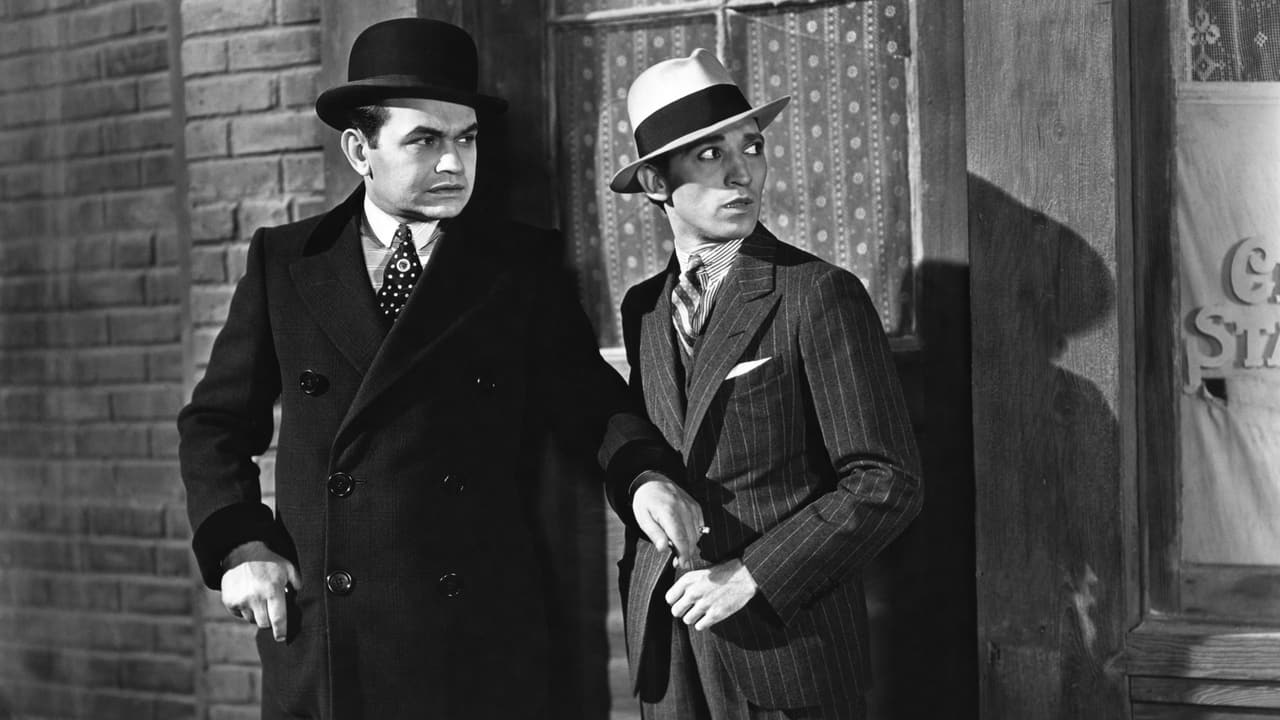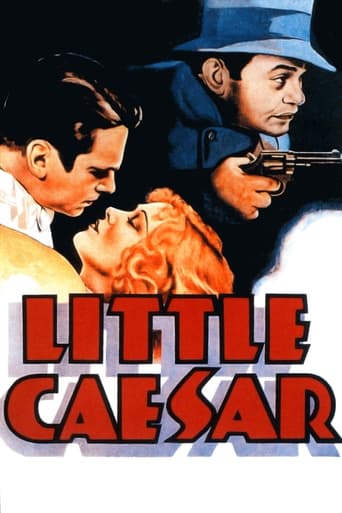

From a personal point of view I like gangster movies very much. But there are two things that really appeal to me. 1.1931 years of gangster films actually involve gay. 2.The gangster is still independent fight with environment of American individualism hero.it is sound film at the beginning of the film now looks more rough, based mainly on the film dialogue, gun shots, but still wonderful.Earlier gangster film. In a minimal way recorded a gangster developed to destroy the life is short, after all the gangster film, the main basic not from the film in a simple story. After watching this movie has a lens always stay in my mind, Little Caesar from his pocket and took out his comb hair. Reflects the characters in the film is very lively.
... View More. . . Enrico Bandello laments before deciding to flatten LITTLE CAESAR's love triangle by gunning down his long-time companion Joe and Olga (the dame for whom Joe has forsaken Enrico in his hour of greatest need). But Enrico doesn't know how to "quit" Joe, either, sealing his own doom. Decades before the supposedly "ground-breaking" flick BROKEBACK MOUNTAIN, the same plot pervades LITTLE CAESAR for all to see, if they care to really look. If you subtract this meaty gray subtext from LITTLE CAESAR's scant 78-minute running time, is there even anything worth noting left? One might argue that the remaining coherent thread tying parts of this tawdry tale together is its vehement pro-Prohibition message. Crime czar Alvin McClure seems hell-bent upon a night of illegal drinking himself at the Bronze Peacock when he's gunned down (perhaps because his ale-addled reaction time is no match for then Tea-Totaller Enrico's). So what's the first thing "call-me-Rico; R-I-C-O" does when he finally lets himself fall under the influence of Demon Rum? He rings up his chief persecutor, Flaherty, of course, and "LITTLE CAESAR" is soon history.
... View MoreIn director Mervyn LeRoy's landmark crime thriller "Little Caesar," actor Edward G. Robinson typecast himself as a snarling, cigar-chomping, tough-guy gangster without a trace of compassion. Reportedly, the eponymous character that he portrayed was based on the real-life crime czar Al Capone. Robinson played variations on his gangster persona in subsequent films like the lightweight "A Slight Case of Murder" and the heavyweight "Key Largo." "Little Caesar" was based on W.R. Burnett's novel. This urban shoot'em up generated quite a bit of controversy when Warner Brothers released it. Some censors claimed the film served as a primer for hoodlums. Now, "Little Caesar" seems tame, even compared with other crime classics such as "The Public Enemy" and "Scarface." Although it was produced before the Production Code Administration acquired teeth to enforce its agenda in Hollywood, "Little Caesar" rarely depicts violence in all its savagery. We see Enrico "Rico" Bandello (Edward G. Robinson) blast innocent bystanders in two scenes. Never do we actually see him pull the trigger. LeRoy edited the action so the violence seems illusionary. In the opening scene, when our protagonist knocks over a gasoline station, he extinguishes the lights, plunging the place into darkness and then a couple of shots erupt. Later, at a night club, a similar incident occurs when Rico blasts Crime Commissioner McClure without realizing who he is shooting. He believes the crime commissioner is reaching to a piece when he blasts him. Nevertheless, all we see is the crime commissioner writhing in agony from Rico's bullets. Even when the violence occurs against Rico, we see no physical manifestation of it. Rico is walking along a city street in broad daylight when a milk wagon cruises past and a fusillade of lead slugs pours out of it and wounds our protagonist. We are never shown the gangsters inside firing the machine gun. The Code expressly forbade scenes of gangsters wielding machine guns because it glamorized the hoods.Basically, "Little Caesar" chronicles the rise and fall of Enrico "Rico" Bandello. Rico and his best friend Joe Massara (Douglas Fairbanks, Jr.) are robbing gas stations in the sticks when Rico decides to clear out for the bright lights of the big city. A newspaper article about Diamond Pete Montana as the guest of honor at an underworld banquet catches Rico's eyes. Secretly, Rico dreams of being like Pete. Rico assures Joe, "I could do all the things that fella does, and more, only I never got my chance. Why, what's there to be afraid of?" Rico and Joe head off to the big city. Rico joins Sam Vettori's mob. Meanwhile, Joe lands a dancing job at the Bronze Peacock gambling club. As it turns out, Rico couldn't have chosen a worst time to join Sam's outfit.. Sam clamors about gun violence and urges his men to exercise self-discipline in the face of provocation. Rico doesn't espouse Sam's ideology. He states, "And when I get in a tight spot, I shoot my way out of it. Why sure. Shoot first and argue afterwords. You know, this game ain't for guys that's soft!" "If anybody turns yellow and squeals, my gun's going to speak its peace." Rico is both fearless but reckless. Rico creates chaos when he guns down Crime Commissioner McClure (Landers Stevens) as the latter appears to be procuring a pistol at the New Years' Eve celebrations at The Bronze Peacock. Not only does Rico kill the commissioner, but he also usurps his boss Sam after the job. Rico has nothing but contempt for Sam. "Sam, you can dish it out, but you're getting so you can't take it no more. You're through." Afterward, Rico's rise is meteoric. Along the way, after he topples Sam and the Big Boy gives him a boost up the ladder. Before long Rico has changes is residence and now it resembles the sumptuous interior of the Big Boy's office. Before long Rico is so big that the opposition tries to rub him out as he strolls down the street. Miraculously, the gunmen riding in a milk wagon try to strafe Rico into stitches with a machine gun.Robinson's performance is superb, and Mervyn LeRoy never allows "Little Caesar" to bog down. Ultimately, "Little Caesar" is a classic.
... View MoreJust less than a year before Cagney's "Public Enemy" and a decade before Cagney made his own version of a similar story with "The Roaring Twenties", Edward G. Robinson played the bootleg King of Chicago, a fictional version of Al Capone. Slithering up the ladder of the mob and quickly taking over, his decline was just as rapid with enemies made not only of the cops but other mobsters as well. This Chicago version of Napoleon is a little guy who bullies everybody along the way, so it is obvious as to why his own mob soldiers will grow to hate him.Slow-moving and even a little creaky, it explodes every time that Robinson is on screen, but slows down to a snail's pace when Douglas Fairbanks Jr. comes on as his protégé. It is also memorable for a cameo by veteran actress Lucille La Verne who made ugliness an art form with her hag like characterization in two epics concerning the French Revolution: the silent "Orphans of the Storm" and the original (and best) "A Tale of Two Cities". She is best known for the face of the crone in Disney's "Snow White and the Seven Dwarfs" which she also provided the voice for. A close-up of her profile is totally unforgettable.Robinson went on to many similar roles (even spoofing this character many years later in "Robin and the Seven Hoods"), and the saga of his rise to fame and fortune shows the ego-building so fast that you know it will be so much fun to watch his downfall.
... View More